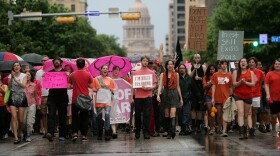
Kathy Lohr
Whether covering the manhunt and eventual capture of Eric Robert Rudolph in the mountains of North Carolina, the remnants of the Oklahoma City federal building with its twisted metal frame and shattered glass, flood-ravaged Midwestern communities, or the terrorist bombings across the country, including the blast that exploded in Centennial Olympic Park in downtown Atlanta, correspondent Kathy Lohr has been at the heart of stories all across the nation.
Lohr was NPR's first reporter based in the Midwest. She opened NPR's St. Louis office in 1990 and the Atlanta bureau in 1996. Lohr covers the abortion issue on an ongoing basis for NPR, including political and legal aspects. She has often been sent into disasters as they are happening, to provide listeners with the intimate details about how these incidents affect people and their lives.
Lohr filed her first report for NPR while working for member station KCUR in Kansas City, Missouri. She graduated from the University of Missouri-Columbia, and began her journalism career in commercial television and radio as a reporter/anchor. Lohr also became involved in video production for national corporations and taught courses in television reporting and radio production at universities in Kansas and Missouri. She has filed reports for the NPR documentary program Horizons, the BBC, the CBC, Marketplace, and she was published in the Saturday Evening Post.
Lohr won the prestigious Missouri Medal of Honor for Excellence in Journalism in 2002. She received a fellowship from Vanderbilt University for work on the issue of domestic violence. Lohr has filed reports from 27 states and the District of Columbia. She has received other national awards for her coverage of the 1996 Summer Olympic Games, the Oklahoma City bombing, the Midwestern floods of 1993, and for her reporting on ice storms in the Mississippi Delta. She has also received numerous awards for radio pieces on the local level prior to joining NPR's national team. Lohr was born and raised in Omaha, Nebraska. She now lives in her adopted hometown of Atlanta, covering stories across the southeastern part of the country.
-
Former President Jimmy Carter, who died Sunday, was president from 1977 to 1981. He remained involved in world politics long after leaving office. (Story aired on ATC on Dec. 29, 2024.)
-
Carter was president from 1977 to 1981, but he was perhaps more famous for the life he led after he left office. He was one of the biggest advocates for peace, democracy and human rights.
-
When Hurricane Katrina made landfall on the Gulf Coast, devastating regions of Louisiana and Mississippi, three of NPR's correspondents saw the storm firsthand. These are their stories.
-
Activists across the nation want to counter the onslaught of regulations that limit abortions and regulate clinics with new laws that protect access to abortion.
-
Delta CEO Richard Anderson says frequent flyers believe voice calls in the cabin would disrupt travel. So the airline announced it will ban in-flight calls even if the FCC changes the rules.
-
Activists from across the country are asking Georgia's governor to support an investigation into the death of Kendrick Johnson, 17, who was discovered dead in a high school gymnasium almost a year ago. State investigators ruled out foul play, but Johnson's parents don't believe it.
-
The Atlanta Braves will abandon downtown for a new stadium in suburban Cobb County. The Braves have played in the city for almost 50 years, and the news came as a big shock to residents.
-
In 2001, Portland, Ore., was the first to develop a new kind of streetcar system. Success there led to a resurgence, with at least two dozen cities planning, building or expanding trolley lines — places like Atlanta; St. Louis, Mo.; and Tucson, Ariz. But some wonder whether it's the best way to spend limited transit dollars.
-
Some clinics say they can't comply with a Texas law set to go into effect next week. It adds building requirements for clinics and places more rules on doctors who perform abortions. Laws like the one in Texas have passed in more than a dozen states.
-
It's been a bumpy week for the new state health care exchanges. Computer problems and the sheer number of people trying to log in overloaded the system. Despite the technical issues, health care navigators are trying to help people figure out their options.






